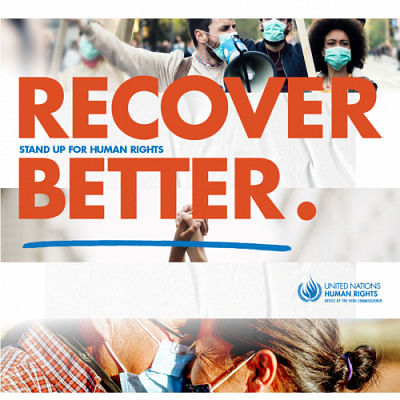Human rights during pandemic

Health is a human right and not a privilege. Human rights are fundamentally linked to global health in the context of the COVID-19 pandemic. COVID-19 continues to grow at a rapid pace worldwide. The theme of human rights day (10 December) for the year 2020 is "Recover Better - Stand Up for Human Rights" with oblique reference to the human rights during the COVID-19 pandemic which focuses on the need to build back better by ensuring Human Rights are central to recovery efforts.
Many governments throughout the world have introduced emergency measures that constrain individual freedoms, social and economic rights and global solidarity. These regulatory measures have closed schools, workplaces and transit systems, cancelled public gatherings, introduced mandatory home confinement and deployed large-scale electronic surveillance. In doing so, human rights obligations have been rarely addressed despite how significantly they are impacted by the pandemic response.
Some of the governments have introduced laws that restrict rights by limiting travel, banning public gatherings and widening powers of detention and force on people failing to self-isolate. New emergency laws have come into force in many countries requiring that almost all individuals stay within given geographical areas or remain confined to their homes. The World Health Organization (WHO) Director General's remarks on COVID-19 emphasised that 'all countries must strike a fine balance between protecting health, minimising economic and social disruption, and respecting human rights.'
The daily press briefing of Bangladesh government confirming about 20% infection rate of tests and death rate is about 1.2%. Its poor health infrastructure is facing a significant challenge. According to a World Bank estimate, public health spending in the country has been historically very low—the healthcare spending has remained at 0.9% of the Gross Domestic Product (GDP) between 2007 and 2019. However, in terms of budgetary allocation, the annual public health spending has rather declined in 2020, with the country allocating BDT 29.5 billion to health care, which amounts to 4.9% of the total budget—0.2% less than the previous year's fiscal allocation.
According to Directorate of health, Bangladesh has just over 550 ventilators (0.000003 per capita) and 1257 intensive care units (0.000007 per capita) for 170 million people, and a shortage of doctors and other trained health workers. 3,654 doctors (0.00002 per capita) and 1,320 nurses (0.000008 per capita) are available across the country to treat COVID-19 patients, and—as of 12 May, only 38 testing facilities are available across the country.
To face the emergency needs, at the early stage of lockdown, a consignment of 1,222,000 surgical masks, 7,500 N-95 masks, 130 thermometers, 2,000 protective gloves, 10,200 medical safety glasses, and 10,459 Personal Protective Equipment (PPE) were transported from China as gift. On 26 March, the Chinese Jack Ma foundation donated 300,000 facemasks and on the same day, China sent a shipment of 10,000 testing kits, 10,000 PPE and 1,000 infrared thermometers. The shortage of necessary medical equipment has not only made the frontline health workers' job difficult, it in fact puts them at the greatest risk of being exposed to COVID-19. This is especially pertinent when physicians themselves succumb to the disease owing to a lack of critical care.
According to the Bangladesh Bureau of Statistics (BBS), more than 40 million people in Bangladesh (24%) live below the poverty line, and 22 million of them (13%) live in extreme poverty—earning less than two dollars a day. A recent study by BRAC assessed the impact of the COVID-19 lockdown on more than 2,500 low-income people living across Bangladesh. It also found that more than 60% of the respondents had lost 75% of their income, and 14% of those living below the poverty line did not have any means to feed their families. Those above the poverty line have also been exposed to the economic shock in the wake of the pandemic.
An estimated 60 million workers employed in formal and informal sectors in Bangladesh, 85%, which is more than 53 million people, work in the informal sector. An overwhelming majority of informal workers, who are mostly daily wage-earners, are directly affected by the closure of regular business and the ban on transport communication.
Moreover, the COVID-19 crisis in Bangladesh has unfolded a disturbing pattern of stigmatisation, public-shaming and discrimination of medical staff, patients and their families. Migrant workers and other travellers who have returned from overseas are facing increasing harassment by both the public and the government.
The formal sector workers too are affected by the closure of business and industries. They have also suffered due to stop of salary and termination from the job due to closer of those establishments. These enterprises in formal sectors also do not follow the labour law and as such, basic human rights are not protected.
People who test positive for COVID-19 must have their right to privacy, dignity and non-discrimination protected by the government. Fear of stigma and discrimination, or even violence, mean that people may not report symptoms or seek medical care when necessary, or when they do, they are likely to hide their actual symptoms, putting their health and the government's public health mitigation efforts at risk.
As a member state of UN and a signatory to the major human rights instruments, Bangladesh authorities must guarantee access to benefits for citizens experiencing income reductions due to this pandemic and must ensure that it upholds the right to an adequate standard of living for all. These benefits must meet the minimum essential level described in the General Comments, which includes food, housing and health services.
The writer is a Legal Economist.

 For all latest news, follow The Daily Star's Google News channel.
For all latest news, follow The Daily Star's Google News channel. 



Comments